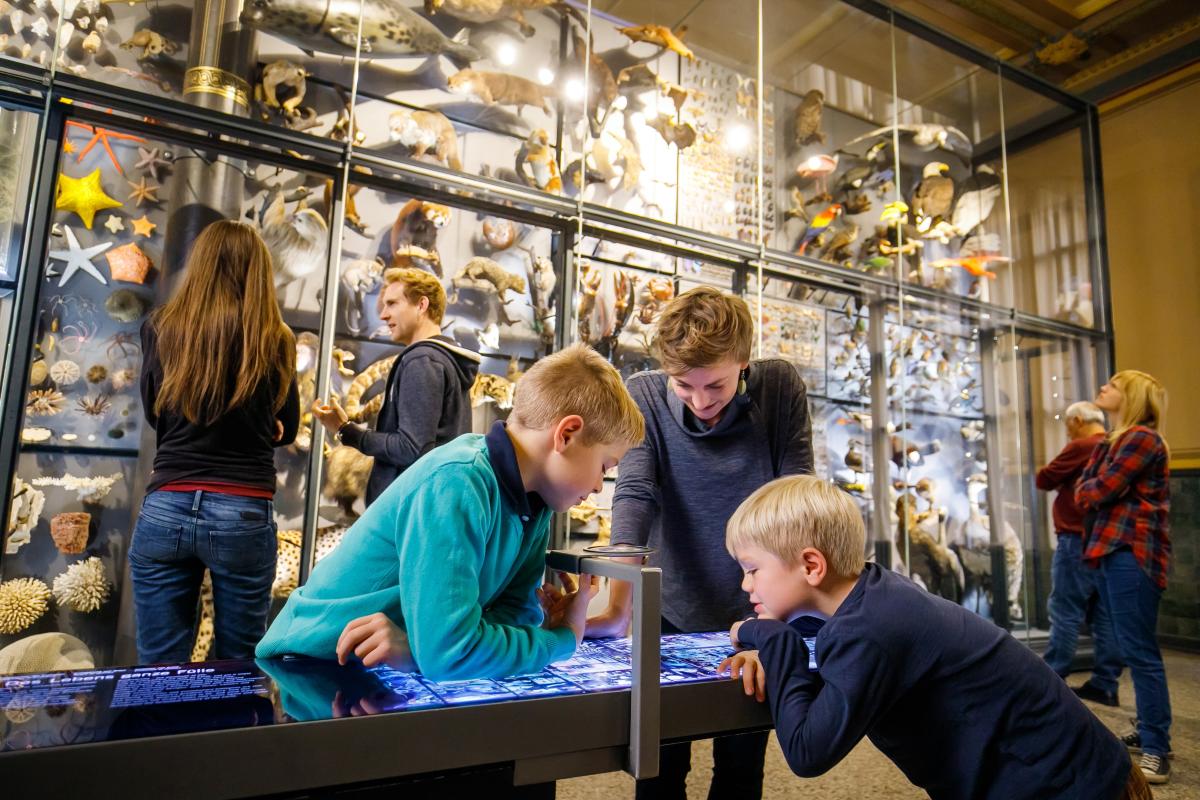Against the backdrop of the UN global sustainability goals (SDGs) and within the ecological and social dimensions of Planetary Health, it is essential to share well-founded and multi-layered information through the means of knowledge transfer and exchange. The Knowledge Transfer project supports the further development of the museum and its exhibitions into a place of living knowledge and open information making the museum's collections and research accessible and tangible. This includes new collaborations between the museum and partners, developing forward-looking formats of interdisciplinary and participatory science, and promoting social debate on the relationship between humans and nature based on scientific findings.
The Knowledge Transfer project currently consists of four sub-projects which through close cooperation map the thinking space for the further development of the museum and prepare, plan, and implement the future analogue and digital transfer of knowledge in an innovative and participatory manner.
Sub-project: Museum Platform
Head: Ulrike Sturm & Stefanie Krzyzniewski
Digital knowledge transfer combines research with integration, openness and participation. We promote dialogue and provide relevant knowledge about nature for science, society, and policy makers. The aim of the sub-project is to develop an innovative, digital communication platform for the museum and its collections. To this purpose, we analyse and facilitate the transformation process, and develop innovative science-based software applications of digital knowledge transfer together with different groups.
- Naturblick
- Natur der Dinge. Eine partizipative Sammlung des Anthropozäns
- Analysis of the museum's website as part of the digital knowledge transfer
Sub-project: Cooperations and Partnerships
Head: Dr Julia Diekämper
As a sub-project, the "Co-operations and Partnerships" team forge links with very different partners from science, art, and society, evaluating various forms of co-operation with them. We do this because we are convinced that the challenges of the present can only be tackled collectively and that different perspectives are necessary in order to obtain as complete a picture as possible. The project therefore focuses on the question of how we can use innovative formats to not only open up participation in corresponding negotiations, but also to make this process transparent and sustainable. The Science Campus for Nature and Society, a project between Humboldt Universität zu Berlin and the Museum für Naturkunde Berlin, represents a very special partnership, combining the expertise of a research intensive university and an integrated research museum in the long term.
- Netzwerk Naturwissen (Network of Nature Knowledge)
- Science Campus for Nature and Society (HU)
- NaturFutur (Biocom, Youse, UdK)
Sub-project: Public Engagement and Impact
Head: Dr Alina Loth
We connect people and research with the aim of working together transparently and democratically to solve questions and challenges facing society as a whole. In the area of Public Engagement and Impact, we create incentives, opportunities and support skill development in collaboration with stakeholders, the public and researchers at all career levels. We promote dialogue and interaction formats for critical and systematic engagement with societal issues and challenges, and facilitate long-term culture change in research helping to open up processes and results of scientific work in innovative, interactive and stakeholder-oriented ways. In doing so, we make a decisive contribution to the professionalisation and networking of professionals in the field of public engagement. A core project here is the Berlin School of Public Engagement and Open Science as a training and innovation hub for local, national and international target groups.
Sub-project: Exhibitions
Head: Uwe Moldrzyk
As part of the knowledge transfer project, Exhibitions is responsible for the development and implementation of new exhibitions within the framework of the Future Plan. Within this sub-project, concepts are developed for the public areas of the campus and museum. These build upon successful exhibition work of the past years, not only focusing on the museum's own research and collections, but also making research processes visible and enabling participation. The project involves museum staff, campus cooperation partners and society in planning, and thus fulfils the goal of an open, integrated, research museum.
A special focus on the development of new permanent exhibitions is also within the interim presentation of the future plan and its development for our public.
Sub-project: Public Science
Head: Dr Susanne Hecker
The task of the Public Science sub-project is to further develop knowledge transfer, including education, on the research side as an exchange of knowledge and part of excellent research, as well as to establish research-based interfaces between politics, science and society. To this end, forms of collaboration between actors from science, civil society, politics and business are being designed, tested and analysed, and sustainable interfaces between science and society, including politics and business, are being identified. The Public Science sub-project will further develop the museum's research in the areas of participation and citizen science, science policy interfaces and innovative out-of-school education, and establish it in the transdisciplinary environment of the museum.
